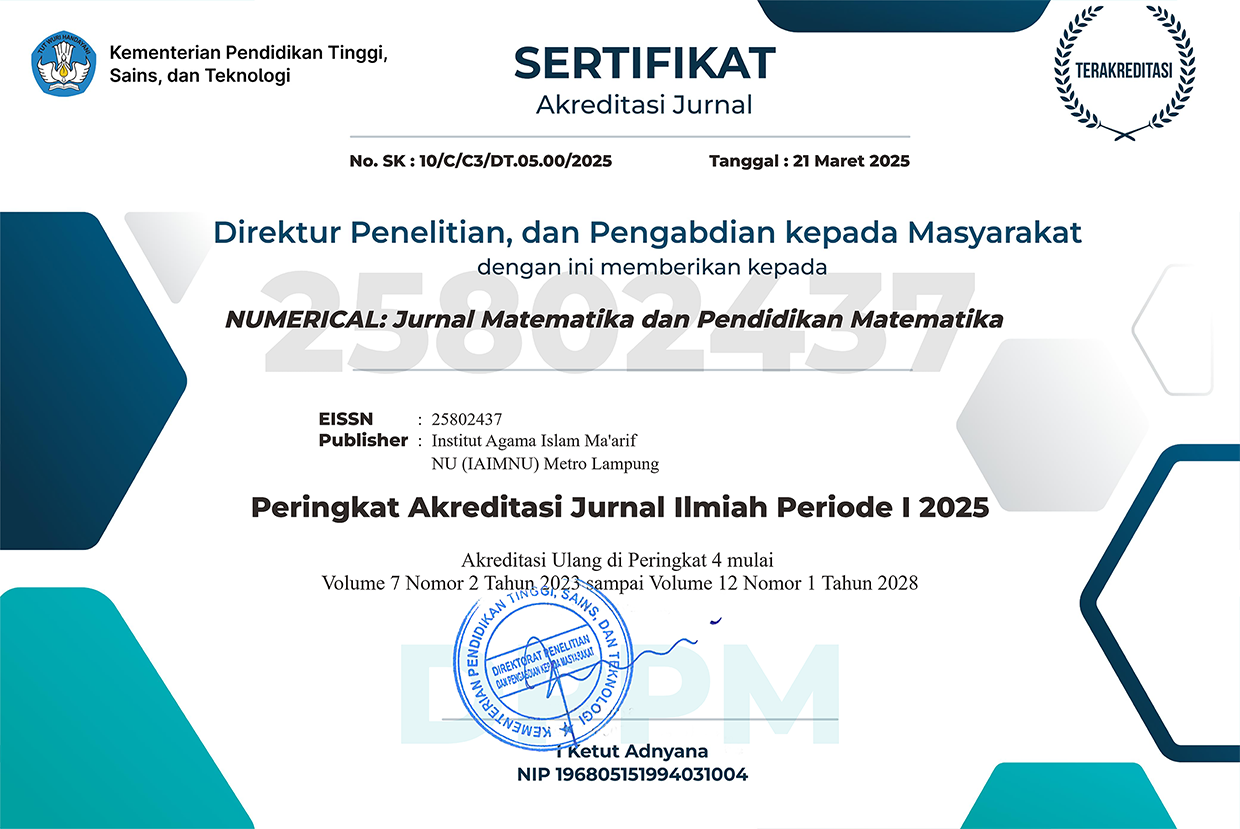Proses Berpikir dalam Memecahkan Masalah Logika Matematika Ditinjau dari Gaya Kognitif Field Independent dan Field Dependent
DOI:
https://doi.org/10.25217/numerical.v1i1.122Keywords:
Cognitive Style, Thinking ProcessesAbstract
The process of thinking is the steps that a person uses in receiving, processing, concluding, and reusing the information obtained to resolve the issues related to solve the problem of the memory. While cognitive style is an activity that became a characteristic of learners in the functioning of mental activities in the field of cognitive (thinking, remembering, processing information, organizing, solving problems, and making decisions) which is consistent. Cognitive style has a major role when utilized in an effort to improve the effectiveness of the learning process. Cognitive styles are divided into two, namely, Field Independent (FI) and Field Dependent (FD). This research is descriptive qualitative which describes the process of thinking of students in solving mathematical problems on material combinations and permutations. The data collection method in this study using GEFT tests to determine cognitive styles of students, test description of material combinations and permutations to obtain the thinking process of students, and interviews. Based on cognitive style, students are grouped into 2 groups: FI and FD, and then subsequently selected two students from two groups of students from the FI and FD to give test of thinking ability and then interviews. Data analysis technique used Miles and Huberman, data reduction, display, and conclusion drawing / verification. Based on the analysis we concluded that students who have the cognitive styles FI tend to have a conceptual thought process. Likewise, students who have the cognitive style FD, these students are also likely to have a conceptual thought process. The process of conceptual thinking is the thought process which solves problems by using the concept that has been owned by the results of studies.References
Herman Hudojo, Pengembangan Kurikulum Dan Pembelajaran Matematika. Malang: Tidak diterbitkan, 2015.
Oemar Hamalik, Kurikulum dan Pembelajaran. Jakarta: PT Bumi Aksara, 2014.
Zainal Arifin, Evaluasi Pembelajaran. Bandung: PT Remaja Rosdakarya, 2009.
Alex Sobur, Psikologi Umum. Bandung: Pustaka Setia, 2013.
Nasution, Berbagai Pendekatan Dalam Proses Belajar Mengajar. Jakarta: Bumi Aksara, 2016.
Departemen Agama RI, Al-Qur’an dan Terjemahannya. Surabaya: Mekar, 2014.
Ruseffendi, Pengantar kepada Guru Mengembangkan Kompetensinya dalam Mengajar Matematika untuk Mengembangkan CBSA. Bandung: Tarsito, 1991.
Rina Agustina and Nurul Farida, “Proses Berpikir Siswa SMA dalam Menyelesaikan Masalah Matematika Ditinjau dari Tipe Kepribadian Phlegmatis,” UMM, vol. 4, no. 1, 2015.
Desmita, Psikologi Perkembangan Peserta Didik. Bandung: PT. Remaja Rosdakarya, 2014.
Wowo Sunaryo Kuswana, Taksonomi Berpikir. Bandung: PT Remaja Rosdakarya, 2011.
Sudarman, “Proses Berpikir Siswa Quitter Pada Sekolah Menengah Pertama Dalam Menyelesaikan Masalah Matematika,” Universitas Tudalako, 2011.
M. S. Anwar, “Efektifitas Pembelajaran PBL (Problem Based Learning) Terhadap Kemampuan Berpikir Kritis Dan Kreatif Siswa Materi Tiga Dimensi,” masters, Universitas Terbuka, 2015.
Zuhri D, “Proses Berfikir Siswa Kelas II SMPN16 Pekanbaru dalam Menyelesaikan Soal-soal Perbandingan Senilai dan Berbalik Nilai,” Pascasarjana MIPA, 2009.
Ningsih, E. F., “Proses Berpikir Mahasiswa dalam Pemecahan Masalah Aplikasi Integral Ditinjau dari Kecemasan Belajar Matematika (Math Anxiety),” Iqra Educ. J., vol. 1, no. 2, pp. 191–217, 2017.
Kepner, MD and Neimark, ED, “Test-retest Reliability and Differensial Pattern of Score Change on the Group Embedded Figured Test,” J. Pers. Soc. Psychol., vol. 46, no. 6.
M. B. Miles and Huberman, Qualitative Data Analysis a Sourcebook of New Methods. London: SAGE Publication Ltd, 1995.
Lailatul Mubarokah, “Proses Berfikir Siswa dalam Menyelesaikan Soal Cerita Ditinjau Berdasarkan Kemampuan Matematika,” 2013.
Hamzah B. Uno, Orientasi Baru Dalam Psikologi Pembelajaran. Jakarta: PT Bumi Aksara, 2012.











